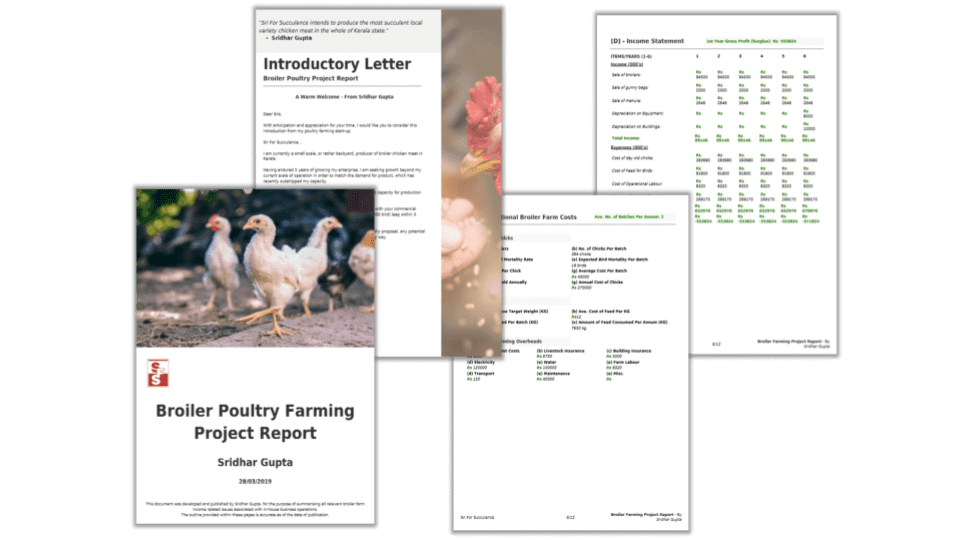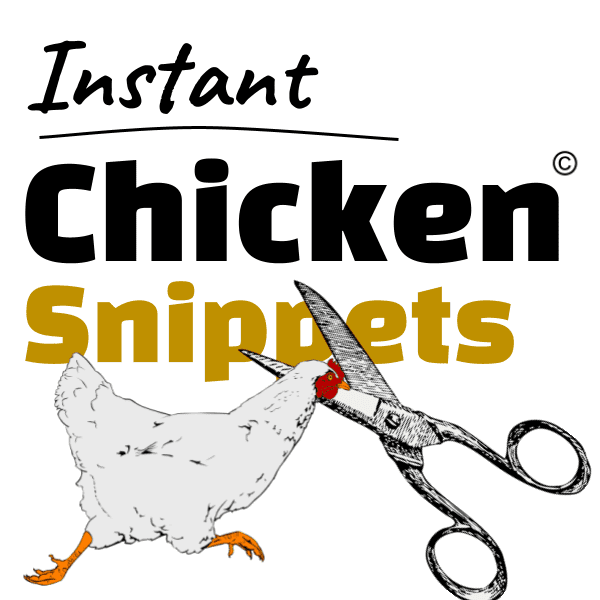One of the most popular questions for any business consultant will be,
“Where can I get funding for my business idea?”
I receive enquiries like this regularly.
And if you ask me, this is the wrong question to ask.
As the old adage goes, ask the wrong question – get the wrong answers…
Or even still, get no answer at all.
To lead someone to the right question…
…I always ask:
“Why do you think you need funding?”
The person answers,
“…to buy land, buildings, stock etc.”
My response…
“Why do you want to buy all this for a price you cannot afford?”

Write Your Poultry Business Plan -
in Just 90 Mins!
Poultry Project Reporter 2.0 - fastest way to write your project report online.
Get Poultry Project Reporter 2.0By this they are often confused.
If you are confused by this too –
Then this email will help you see a better (more sustainable) approach to funding your start-up farm…
…without borrowing money.
Firstly,
The truth about finance
Finance is the acquisition of money, at a cost.
In other words, buying money.
If you can get your head around it, you’ll understand the rest of this no problem.
You might be thinking at this stage – “I thought you used money to buy things?”
Whilst this is true in most commercial markets,
It isn’t true of the commercial money markets.
They are the one place where money is the product.
And you buy it with money at a delay of ‘X’ months.
In other words,
You buy money today, at the price of money tomorrow.
The cost being the interest charged on the money tomorrow.
This interest charged is the difference in money taken by your lender…
[Often received as money on top of periodic repayments]
…justly taken for the service of giving you the enjoyment of having money today, which you never had.
This is the basis of finance.
The problem with finance though is manifold.
Here are just a few issues:
#1 – the value of money is depreciating:
- What does this mean?
- A certain amount of money today is worth less tomorrow…why?
- Because the cost of living continually increases, never decreasing
- This is an additional cost which silently strips away the buying power of your money.
- Interest is usually charged over and above inflation
- So, the lender doesn’t lose out…
- The borrower absorbs this cost and repays at a rate to compensate the lender
- A certain amount of money today is worth less tomorrow…why?
#2 – the agreement to borrow money is legally binding:
- What does this mean?
- Can’t pay? Tough, you MUST pay. You will be forced to. By courts of law.
#3 – default and lose everything inc. security like your family home:
- How?
- Lending in business is often secured against an underlying asset.
- Where there are unlimited losses, and default – the borrower may end up having their personal property seized and forcibly sold.
#4 – often the benefit is not worth the cost (or potential loss):
- What are the alternatives?
- Starting smaller, operating within your means takes longer to reach critical mass, but…
- All gains along the way are yours to keep.
- Starting smaller, operating within your means takes longer to reach critical mass, but…
Loans
Loans are when a lender gives money today to a borrower who meets certain criteria.
The criteria relates to the borrower’s credit worthiness.
In other words,
How likely it is that the borrower is going to be able to pay the lender back as promised?
Loans often have monthly repayment terms.
This means…
…from the first month of trade,
A farm may be liable to begin making repayments to the lender on the amount owed (+ interest).
The problem is, as with any agricultural business growing from scratch,
You need to operate for some time initially before your crop/harvest/stock matures to give you profit.
In this interim, you will be forced to make loan repayments out of your own pocket.
It isn’t until your farm turns a profit that, you will be relieved from this duty.
The argument is that if you are willing to self-fund the seedling stage…
…why not completely bootstrap the venture? I.e. start small and gradually grow within your means.
A loan, therefore, would be unnecessary.
Gov’t Subsidies
In error, some consider a government subsidy to be equivalent to a grant.
Without cost.
This is not the case.
Have you ever heard of a back-ended subsidy?
Popular with lenders like State Bank of India, for assisting the start-up of new farms.
Subsidies are monies that either the national or local government have promised to pay the farmer…
…when, the farmer has paid back a commercial loan in full.
Often governmental bodies will offer a percentage of total borrowed loan funds,
…like 25%.
In which case,
25% of the total borrowed funds is given as a cash injection paid to the farmer as a capital lump sum,
BUT, only when the commercial loan is paid back.
This benefit of this method, of course, relies entirely on the farmer’s ability to acquire and repay their own loan agreements.
If keeping up with interim payments of a loan is a distant possibility,
Then such a subsidy would not make sense.
Governments use subsidies to encourage or oil the gears of commercial lending to particular sectors.
Agriculture is one such area that governments favour giving subsidies.
Why?
The produce puts food on the nation’s table.
This productivity is always encouraged by the government.
The downside for farmers though is you need a loan to qualify.
A better way
Have you ever thought of asking directly for what you need?
[Rather than asking for the money, I mean.]
Put it this way,
Banks buy and sell money – alongside other financial products.
They earn money by taking a margin on every trade that lands on their table.
If you don’t have the money to buy goods or services,
You CAN approach your bank for a loan.
What will you need to get one?
Creditworthiness and a solid business plan or project report.
Your plan or report is your written case for what you intend to do and why your bank should invest.
It is collateral.
If persuasive, and you seem to have a track record that implies your trustworthiness,
Banks will lend.

Read The Poultry Business -
Like Never Before!
Chicken Snippets Newsletter - deep poultry analysis to sharpen your acumen, by email.
Get My NewsletterBut if you expect your business plan to persuade commercial money lenders…
…why wouldn’t it ALSO persuade:
- commercial suppliers,
- partners, or;
- landowners
…for example?
You don’t want their money, but you would prefer their:
- livestock feed
- equipment
- land
Not for free, but in exchange for long term business, once you are up and running.
For the sake of them giving you an initial kick start for say, 3 months…
…A potential partner or supplier might gain years worth of profit in liberal gratitude.
Present your pitch in your business plan.
The bottom line…
The effort it takes to acquire finance for money, may as well be used to directly get the things you need, like:
- supplies
- support services
- land
- buildings
Money drops in value continually because of the rising cost of living.
Therefore, it is better to handle goods and services (inputs for production), than to handle money.
Your business can convert such inputs into profit which increases your monetary value.
Use your business plan as collateral to gain support where it matters most. For profit.
Now over to you…
Are you currently applying for funding to start your farm business?
Have you already received funding for your project?
Are you starting sustainably?
Whatever the case is, I’d be interested to hear from you.
(I read every comments.)
Speak soon,
Temi
Leave a Reply